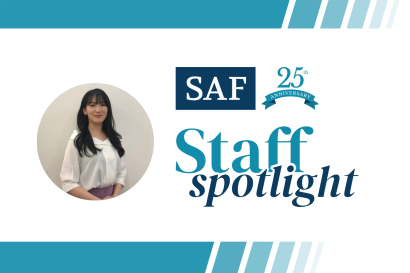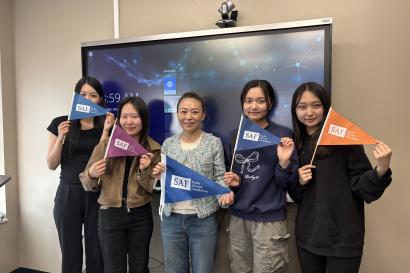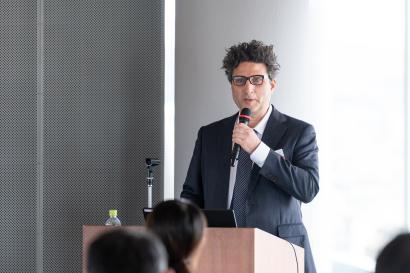As the world enters into its third pandemic year, with new variants posing unpredictable new challenges for the future, Asia remains a tightly restricted region. Countries like China, Japan and South Korea all continue to enforce measures like strict border controls, public mask mandates, contact tracing apps, and vaccine passports, which have become commonplace in many Asian cultures.
Residents of Asia have come to associate pandemic restrictions with basic safety and preservation of life – literally a matter of life and death. It may come as a shock then, to arrive in Western societies where these everyday social controls are absent, replaced instead by an emphasis on personal freedoms and a return to business as usual.
So what is it like for a young person from Asia to experience this firsthand? How are SAF students navigating the circumstances of studying abroad during a pandemic, facing divergent approaches to public health, each rooted in different cultural values? We asked two students – one living in the UK, the other in the US – about their experiences with “COVID-19 culture shock” during their time abroad.
Emi Itabashi: a relaxed approach to COVID-19 guidelines
When Emi Itabashi, 19, flew to London in September 2021 for her study abroad program, she wasn’t worried about risks from the continuing pandemic. “At the time, just before I left Japan, the COVID-19 situation in Europe and the UK was much better,” she recalls. “I read that around 70% of the UK was vaccinated, and that really reassured me that it was safe to travel there.”
Itabashi, who is from Chiba, says that she was more concerned about public attitudes towards masks, having read about anti-mask demonstrations in the UK. “Once I arrived in London, one of the first differences I noticed was that people in the UK don’t like to wear masks – which I thought might be the case,” laughs Emi. “Even in very crowded areas, like Oxford Street [a famous shopping district in Central London], people still don’t wear them.”
While masks are required on public transportation, Itabashi says that many businesses, such as supermarkets, restaurants, and clothing stores, don’t ask customers to mask up before entering. Moreover, at her host university students must wear masks when they’re in class, but Itabashi says that it’s hard to enforce that rule in large lecture halls. Many of her fellow classmates choose to go maskless – a startling cultural difference for Itabashi, who is accustomed to more consideration of classroom rules.
Similarly, her host university recommends that students test regularly for COVID-19, providing them with lateral flow tests to do twice a week from their residence. Itabashi says students don’t have to submit their results; the expectation is that students who are ill will self-isolate on their own accord. This is a good system to have in place, she asserts, but also an imperfect one; Itabashi says she knows of several students who simply don’t use the tests at all.
With two variants, Delta and Omicron, proliferating in the UK during her semester abroad, the Japanese sophomore describes being most surprised by what she perceives to be a general indifference to the pandemic.
“People here [in the UK] don’t seem to think the situation is getting worse, and I don’t think they realize the reality,” she observes. “Even as infection numbers are rising every day, there are still people who refuse to wear a mask; asking people for proof of vaccination isn’t that important, either. I wonder if it’s because people in the UK just don’t care about COVID-19 anymore.”
Yuta Oe: impressively swift pandemic response on campus
Japanese student Yuta Oe’s first attempt to study abroad didn’t go very well; a week before he was due to fly to Australia in 2020, his trip was canceled because of travel restrictions. Instead, he set his sights on studying in the US the following year, driven by his passion for baseball and American cinema – the High School Musical film series, in particular.
When he was accepted to a program in Boulder, Colorado, he jumped at the chance to participate in another study abroad opportunity, even with the ongoing challenges of a pandemic. Oe soon found out that in order to study at his host university, however, there would be strict COVID-19 protocols he was expected to follow.
“At my school, we’re required to wear masks everywhere on campus,” says Oe. “We also have to get a COVID-19 test done every week, and students have to prove that they’re fully vaccinated.”
The added scrutiny on students in the US is different to what Oe was used to at his home university, where masks are widespread but other protocols differ.
“It actually made me think that the United States was faster in its response, and ahead of Japan when it came to COVID-19, which I thought was really cool,” explains Oe. Rather, his chief concern prior to his trip was whether he would face anti-Asian discrimination.
Like many in Japan, Oe had read articles about Japanese communities in the U.S. being targeted amidst a wave of anti-Asian sentiment related to COVID-19. The 23-year-old said he had reservations, and was even anxious about being heckled on the field if he joined the college baseball club.
Thankfully, Oe’s fears were unfounded. He was welcomed into the sports club, made friends both on and off the playing field, and like many residents of Boulder, spends most of his time enjoying nature in the great outdoors. The experience has strengthened his belief that differences caused by the pandemic – including discrimination – are temporary, and will dissipate with time.
“I don’t believe that human relationships will be broken by COVID-19. As long as two people get along and can find common ground, then who cares about where someone is from or what they look like?”




